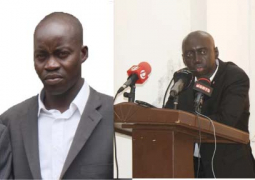Gambia Revenue Authority (GRA) recently organised a two-day validation workshop on Value Added Tax (VAT) Law held at the Paradise Suites Hotel in Kololi.
Speaking at the opening ceremony, the permanent secretary at the Ministry of Finance, Mod Secka, said the Gambia government has undertaken several public financial management reforms some of which have been ongoing and the most important one is the introduction of VAT which is scheduled for January 2013 and also mid-term expenditure reforms among others.
PS Secka said: “The introduction of the VAT goes with lot of processes that have been highlighted and some of which include the introduction of a VAT Law.”
He added that the validation document has been lucky that the income and sales tax which has been the major legislation on income tax has been modelled to accommodate this kind of tax, ‘now is to do an amendment on the income and value taxation.’
According to PS Secka, the other processes that are involved also include capacity building because the introduction of Value Added Tax is so demanding in terms of capacity at the level of the GRA.
“It has to be greatly enhanced during the course of the remaining months of the year and gears up towards the challenge that has been assigned to them by the Value Added Tax.”
PS Secka said that in addition to sensitization to the capacity building there would be a comprehensive sensitization campaign.
“You would know that Value Added Tax is an all income comprehensive and it requires all stakeholders to be adequately informed about details and expectation that the authority would have on the taxpayers,” he said.
PS Secka revealed that the issue of enforcement was raised by their partners at the IMF and think there are pre-conditions that are needed before the introduction of the VAT.
PS Secka also said there are action plans that have been agreed with GRA and the IMF and these actions are key deliverables that are to be made towards the end of this year.
“The introduction of VAT is so demanding it requires all hands on desk from senior management level of GRA to the policy level at the Ministry of Finance,” he said, adding that the government tried hard so that the tax reform is successful.
For his part, the IMF resident representative, Meshack Tunee Jirongo, said the event marked a major milestone in the timetable to launch the VAT.
He said under its regional ECOWAS commitments, the Gambian authorities intend to introduce VAT by January 2013, adding that this will be a key driver to tax reform programme.
Mr Jirongo said: “An IMF technical assistance diagnostic mission in May 2010 found that revenue administration in The Gambia has undergone major reform and formation of the Gambia Revenue Authority (GRA) in 2006 provided a solid foundation for introducing best practices.”
The IMF official said that the recent tax administration improvements provide a solid foundation for a successful VAT launch by January 2013.
According to him, IMF mission designed a challenging but achievable 30-month program of tax policy reform and revenue administration with the right strategies for further reform supported by improved tax policies, and determination by the GRA board and management to continue to strive hard for more progress, a successful launch of VAT by January 2013 is viable with further improvements to the tax system and its administration.
Mr. Bakary Sanyang, Commissioner General of GRA, in his welcoming remarks, stated that the validation of the first draft law involved the private and public sectors.
Read Other Articles In Article (Archive)
Alleged murder case adjourned
Oct 5, 2012, 11:46 AM
GFA 2nd Division roundup
Aug 14, 2012, 1:01 PM



